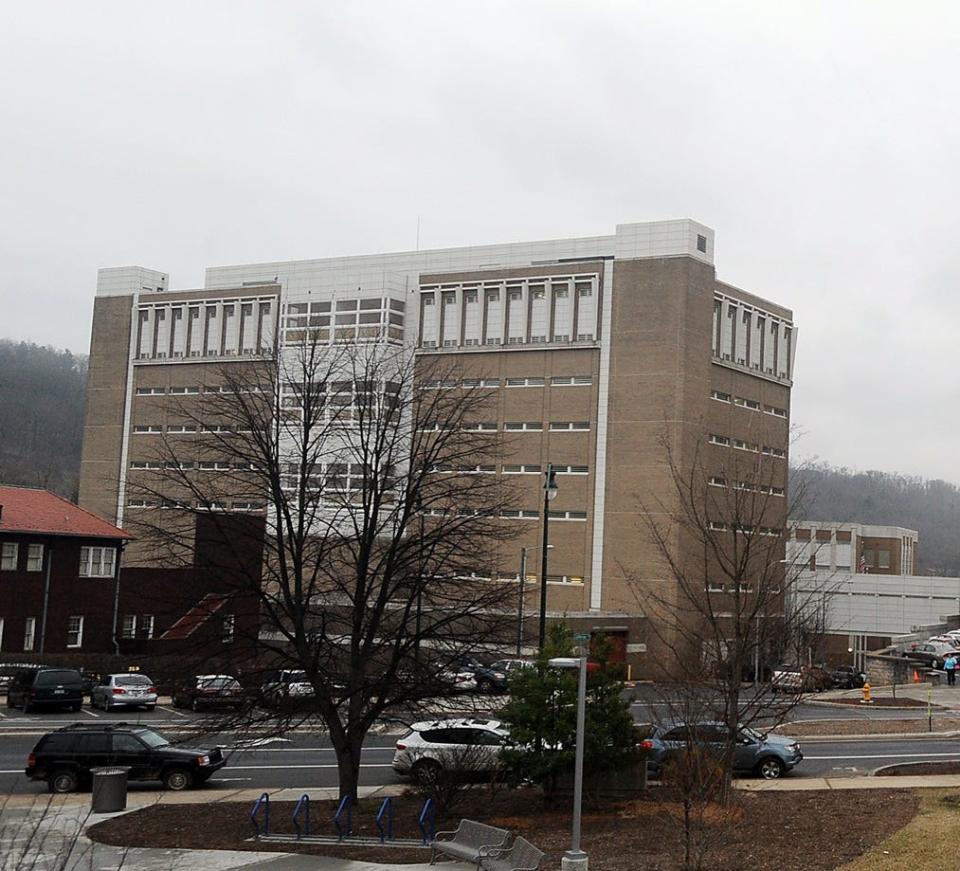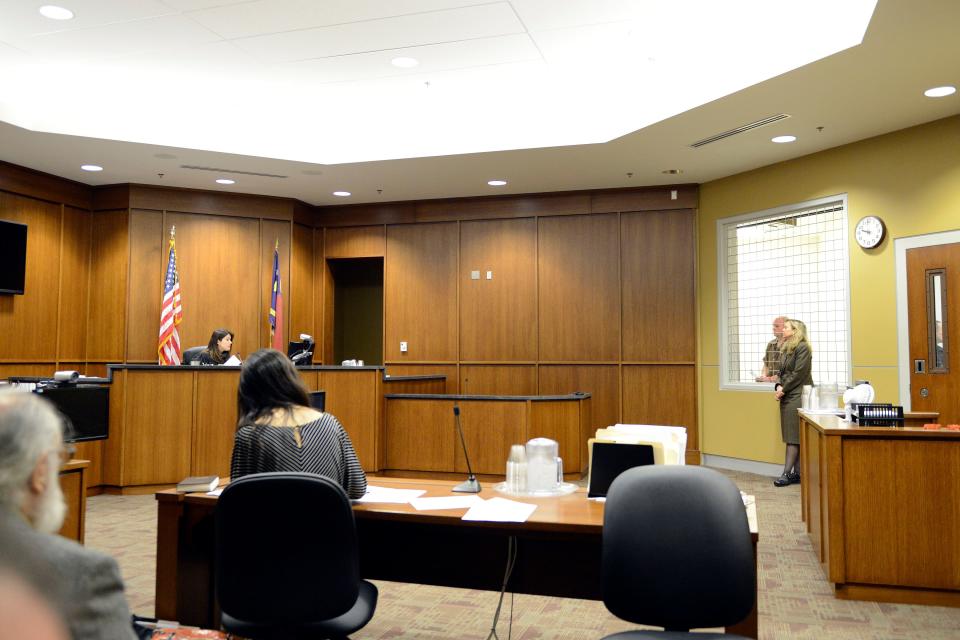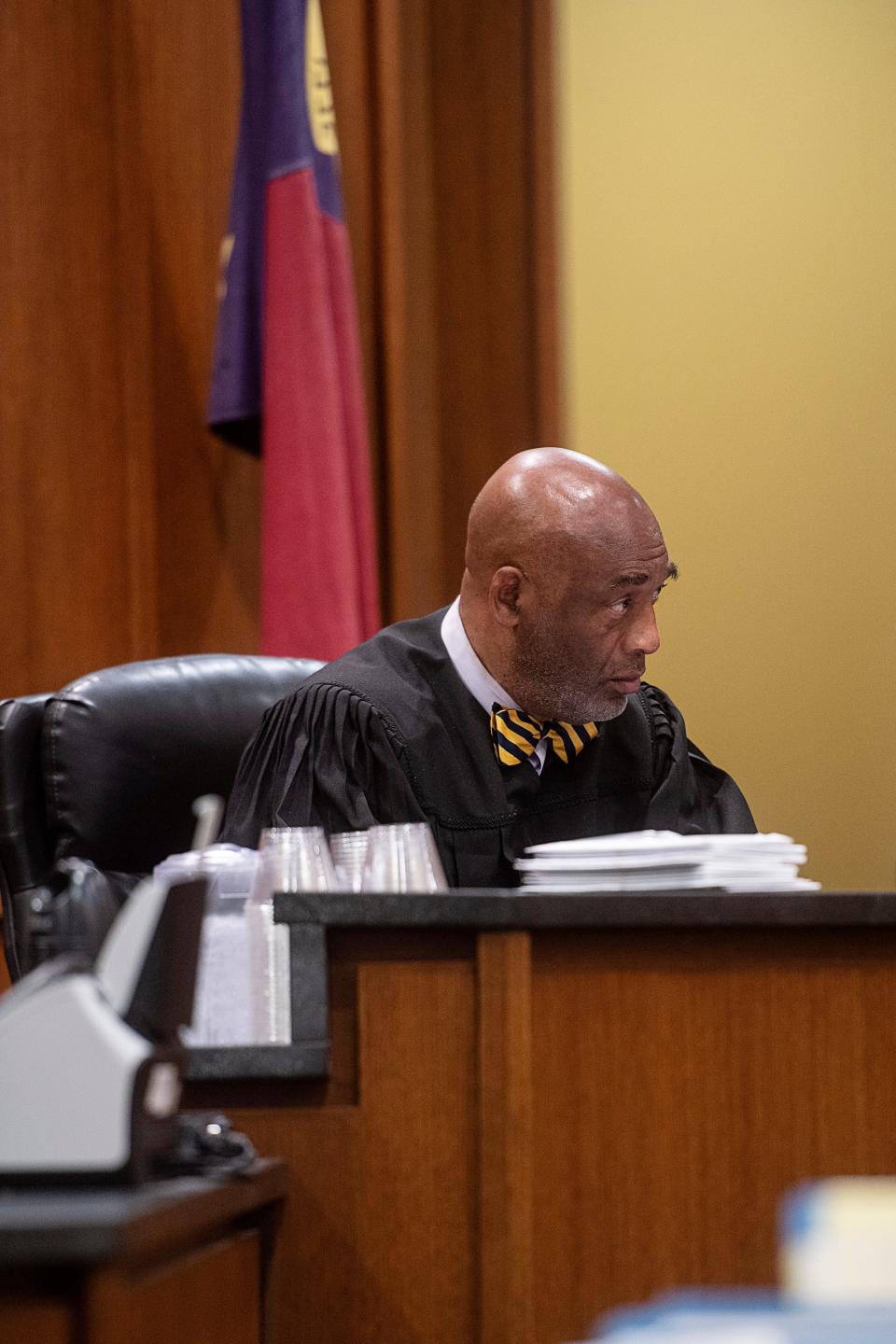Malfunctioning Buncombe court video monitor may violate detainees' rights, break state law
ASHEVILLE – One December morning in a Buncombe County District Courtroom, defendants appeared in front of Judge Patricia K. Young on a video screen for their first appearance.
Defendants shuffled in and out of a close to cell-sized room in the jail for the hearing. Sitting in a red chair, some detainees leaned over, so those in the courtroom could only see the top of their heads. One turned an ear to the camera, intently listening to Young’s faceless voice beamed into the room.
At one point Michael Casterline, the public defender in the courtroom, asked a defendant, "can you see us?"
“No, I can’t. I can’t see you,” he responded. “But I can hear you.”
The video monitor where Young should have been visible was blank, a common occurrence for defendants' first appearance in Buncombe District Court, according to attorneys, court officials, county documentation and correspondence. Emails between county and state court officials indicate the system that connects to the monitor has not worked consistently for around two years.
It is a technical difficulty with larger implications.

Public defenders say the blank video screen makes it difficult for defendants to understand what’s happening. Defendants say the process is frightening and confusing. Conducting the hearing using the blank monitor appears to conflict with state law because all parties must be able to see and hear each other.
"Except as otherwise provided in this section, judicial officials may conduct proceedings of all types using an audio and video transmission in which the parties, the presiding official, and any other participants can see and hear each other," reads the North Carolina General Statute dictating audio and video court proceedings.
"Judicial officials conducting proceedings by audio and video transmission under this section must safeguard the constitutional rights of those persons involved in the proceeding and preserve the integrity of the judicial process."
Legal experts have serious concerns that the broken video system violates defendants’ due process rights, enshrined in the North Carolina and U.S. Constitution. The Brennan Center, a law and policy institute, reflected similar concerns in studies conducted during the height of the pandemic, when remote court became increasingly prevalent.
During a defendant's first appearance, a judge reads the detainee the charges against them and the maximum possible penalties for those charges. Then defendants determine whether they want a court appointed attorney, to hire an attorney, or to represent themselves. Finally, if the defendant has other pending charges, has been charged with certain violent crimes, such as murder and aggravated assault, or domestic violence, the judge will set a bond. Otherwise, a magistrate sets the bond.
Buncombe County district courts began using virtual first appearance during the COVID-19 pandemic, sheriff’s office spokesperson Aaron Sarver told the Citizen Times in a January email. Judges have discretion over whether defendants appear in person or virtually, he and other court officials familiar with the situation said. The jail is connected to the court through a secure walkway, Sarver explained. It takes just a few minutes to access.
More: Digital eCourts system at center of a federal lawsuit is coming to Buncombe County
More: Chief Buncombe District Court judge Hill, county's 2nd Black judge, won't run in 2024
Some judges have navigated these technical difficulties by offering defendants the choice to appear in person, rather than virtually. According to lawyers appearing in front of these judges, and Citizen Times observation, some judges are more explicit than others about the offer to join the courtroom for defendants' appearance and the sight requirement afforded by state law in these situations.
These conversations occur while the defendant sits in the jail. Defendants who have navigated the process told the Citizen Times they felt uncomfortable asking to join the courtroom because they didn’t want to inconvenience or anger the judge. They also said by choosing to appear by video from jail that they didn’t realize they were relinquishing a right afforded to them by the state.
The Citizen Times made multiple requests for comment from district court judges Edwin Clontz, Julie Kepple and Young, as well as county District Attorney Todd Williams. None responded.
Sheriff's Office funding: Buncombe approves sheriff's Downtown Asheville patrols partially targeting homeless

'It's happening but it's not'
Kimberly Stephenson appeared in Kepple’s courtroom in January while the monitor was blank. She told the Citizen Times that she didn’t fully understand what happened during her appearance, and that it might have been easier to understand the proceeding if she could see the judge.
“It’s almost like a dream in a way,” she said. “Or like a bad nightmare.”
Stephenson said she wouldn’t have wanted to come into the courtroom because she felt sick at the time. Despite Kepple giving her the option to appear in-person, Stephenson said she didn’t realize she was entitled to see the judge during the proceeding. She thought Kepple’s offer was a “trick question.”
Lloyd Francis also appeared in front of Kepple the same January morning as Stephenson. The monitor didn't show the judge during his appearance. Francis told the Citizen Times he didn’t want to go into the courtroom because he gets anxious when he’s around people, but even if he had wanted to go, he was unaware that it was his right to see the judge.
“I was scared because it’s a judge and no one wants to make her mad,” Francis said. “And because the screen is blank, you’re thinking, ‘Well, maybe the thing has malfunctioned and they still got to proceed no matter what.’ I didn’t know and I don’t know every single law they throw out there.”
Francis said he would have preferred that the hearing was delayed until the screen worked.
Defendants navigating these processes attempt to be compliant, Second Vice President of the National Association of Criminal Defense Lawyers and Charlotte attorney C. Melissa Owen told the Citizen Times in January.
“These people are already in a custodial situation,” Owen said. “Judges are typically the people they fear.”

Owen questioned whether state law allowed courts to waive the requirement for all parties to see each other during a court proceeding.
“I don’t know that you can obtain a waiver for that,” she said. “Any waiver that you would get would have to be knowingly, voluntarily and intelligently waived.”
She later added that a judge would need to be explicit about the state law and defendants' rights for that waiver to be valid.

The 14th Amendment of the U.S. Constitution prohibits states from depriving “any person of life, liberty, or property without due process of law.”
The 19th Amendment of North Carolina's Constitution says, "No person shall be taken, imprisoned, or disseized of his freehold, liberties, or privileges, or outlawed, or exiled, or in any manner deprived of his life, liberty, or property, but by the law of the land."
Owen views using the blank monitors during first appearance as a basic due process violation. She said that people need to understand the process they navigate and what’s happening during a proceeding.
"Seemingly mundane technological glitches can have a substantial impact on the fairness of court proceedings," a September 2020 Brennan Center article read. "Courts must have a plan in place to respond when a party cannot be heard, or cannot hear, at a critical juncture in their case."
"Courts should prioritize the parties’ interests above efficiency and the drive to conclude cases, being sure not to penalize parties for technological difficulties."
Chief District Judge Calvin Hill, who is retiring at the end of his term, told the Citizen Times Jan. 13 that he believes the malfunctioning system have created a technical violation, but not a due process violation. Hill did not respond to multiple Citizen Times follow-up requests to further explain his perspective.
A perfunctory government response
Court and county officials have staged a perfunctory response to fixing what seems like a simple problem. Staff involved in the situation have struggled to identify what arm of the government is responsible for funding a fix. County leadership stopped monitoring the problem while it persisted. While the wheels of bureaucracy turned slowly, the courtroom monitor continued to not show the judge.
The malfunctioning system was discussed during a February 2023 meeting between jail and county staff and court officials, notes from that meeting written in an email the Citizen Times obtained through public records request indicate. According to the notes, the camera in one courtroom had not functioned for more than a year. A meeting attendant familiar with the situation said that the "camera" was referring to the monitor not showing the judge in the jail.
Jail administrator and sheriff’s office Capt. Jeffrey Littrell responded to that email the same day, saying “I think the biggest hang up is who is going to purchase this system and be responsible for it.”
County courthouses share jurisdiction with the state. Buncombe County is responsible for facility and infrastructure and North Carolina, through the Administrative Office of the Courts, is responsible for operating the expenses of the court, UNC School of Government professor Shea Denning told the Citizen Times in a January 2024 email.
Littrell, justice service and county staff traded emails on that thread until July, trying to figure out what part of county government would pay for a replacement.
Littrell said in a July 2023 email to county justice services and jail staff that he wanted to add the system replacement to the sheriff’s office budget request. He noted that it was not high on his priority list because it “marginally benefits detention.”
The thread ended in July 2023 after staff found that repairing the system was part of the agreement with the contractor it uses for maintenance.
Assistant County Manager DK Wesley, who is also the chair of the Justice Resource Advisory Council, a group of county, city, law enforcement, court officials and justice organizations, told the Citizen Times in a January email that she became aware of the issue with the monitor in July 2023.
Wesley, one of the most senior members of county staff, said that she became aware that there were still concerns about monitors during a December 2023 JRAC meeting.
Buncombe jail staffing: Buncombe jail has staff exodus, 125% turnover; sheriff seeks raises; highest NC death rate
According to tracking providing by county IT, the monitors did not show the judge in October and November of 2023.
"As I am not a user or administrator of the system, I have not been coordinating a resolution for any operational or technical issues with the monitors," Wesley told the Citizen Times. "I have, as JRAC Chair, asked that this item be included on our next steering committee agenda so all partners can discuss the current utilization of the video arraignment system."
The next JRAC meeting is Feb. 2.
Court Clerk Jean Marie Christy told JRAC during the December 2023 meeting that county and court staff still struggled to identify what entity is responsible.
The county’s Information Technology Director Vance Bell said he doesn’t think the system needs to be replaced.
Buncombe County often doesn’t know when the system is broken because county staff isn’t notified, Bell told the Citizen Times in January. Lawyers, judges and bailiffs needed to tell an assistant clerk when the technological system didn’t work, who would then convey that information to the county. He said his ideal long-term solution would be moving to a state-launched audio-visual system.
As the Citizen Times was reporting this story, Buncombe County changed its system for evaluating whether the system functioned. Previously, judges would learn if the technology malfunctioned when they sat on the bench and court began, County Senior Attorney Jorge Redmond told the Citizen Times in a Jan. 16 email. Now, jail deputies will check to see if the monitors show the judge before the proceeding begins, allowing deputies to coordinate transporting detainees before court starts.
“We are currently waiting to meet with County IT to think of a long-term solution,” Redmond said.
More: Judge denies HCA contractor TeamHealth motion to dismiss in Buncombe County lawsuit
Mitchell Black covers Buncombe County and health care for the Citizen Times. Email him at mblack@citizentimes.com or follow him on Twitter @MitchABlack. Please help support local journalism with a subscription to the Citizen Times.
This article originally appeared on Asheville Citizen Times: Blank Buncombe County court monitor may violate defendants' rights

